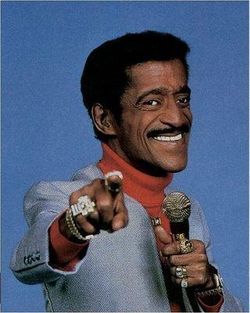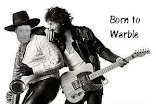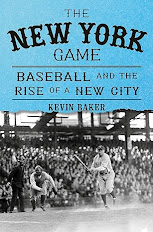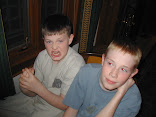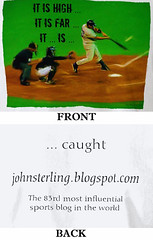Anybody have a sense of deja vu watching Didi's hideous, season-ending slide on Saturday?
It could have been an exact replay of The Gleyber wrecking his wrist, sliding across home in some vital RailRiders game last season.
Look, I know that injuries are a part of the game, and they can happen anytime and anywhere. The Yankees in their long history have had not one but two centerfielders—in two different parks—who seriously injured themselves stepping into sprinkler holes. They had a manager who ended his season punching out a marshmallow salesman, and Kevin "The Idiot" Brown who ruined our 2004 season punching out a wall.
It happens.
But this now makes two vital players hurt in as many seasons because they don't know how to slide, feet first, across home plate.
But why would they? Sliding—and running in general—doesn't matter. Neither does fielding. Or situational hitting.
This I know, because the Moneyball Bible tells me so.
Rob Neyer, the baseball writer—and now commissioner of a summer college league out west—was in the Paper of Record this weekend, promoting his new book, Power Ball: Anatomy of a Modern Baseball Game, and kvelling on and on about the New Baseball:
"So much of baseball now, far more than any previous era, is about power. It's about power hitting, power pitching, and power in the front office as well. The front office staffs are immensely larger than they were 20 or 30 years ago, with dozens and dozens of more employees, because the money's so much bigger and the data's so much more powerful."
Stop right there.
I can well believe "the money's so much bigger." The Big Money—the title of a John Dos Passos book, many years ago—is everywhere, and it's what's killing so much of America, and has been for a long time. Money for its own self, money not from any worthy labor but just money gained through the constant manipulation of money, and the exploitation of those who have the least of it.
I'm also not surprised that a class of bureaucrats has seized an opportunity to multiply itself. I read somewhere recently that the California university system—once the cheapest, and one of the best higher education systems in the world—has the same number of faculty members it did 40 years ago. But the number of administrators has increased something like fourfold, until there are now more bureaucrats than teachers.
But I digress (Moi?)
The power, and the money, are also killing the game I love. You can see it everyday, in every way, getting worse and worse.
The essence of the game of baseball is so incredible that it cannot be just about power. In every other sport, sure, the fact that human beings are just so much bigger, faster, and more muscled than ever before has inevitably distorted them.
You literally cannot run the old Lombardi sweeps anymore in football, for instance. The linemen are just too damned big to do it. In basketball, the players have outgrown the court, and in hockey they have outgrown the ice. (Soccer remains much the same...because it's soccer.)
But in baseball there always were, and there still remain, ways around the power game. Someday, if we're lucky, we'll discover that again.
I was thinking, with that one-game play-in in Oakland staring us in the face, about how the old Moneyball A's came up short, again and again and again.
Moneyball, of course, always was more of a book-and-movie pitch than a reality. The Athletics teams at the turn of the new century really revolved around a great starting pitching staff, and a terrific left side of the infield, including a shortstop who was probably juicing to the gills (and for awhile, a first baseman who was doing the same, as we discovered to our great dismay).
But there was something to be said for it. People such as Rob Neyer and Billy Beane and many others really did discover many things about the game that should have been obvious all along—things about how much power and getting on base really do matter.
(Well, all right, so Earl Weaver discovered the power part a generation before. He was Earl Weaver!)
But the dictum that—
—Baserunning doesn't matter
—Fielding doesn't matter
—proved to be, well, a Dictum Disaster. They do matter. And they brought the A's down again and again:
2000—A Yankees team that had stumbled all through September, finds itself with its back to the wall, in Oakland for a Game Five in the ALDS. But Terrence Long, the A's centerfielder, loses a ball in the sun—in his own park—and the Yanks go on to score 5 runs in the first inning, hang on for a 7-5 win, and eventually win the World Series.
But remember: fielding doesn't matter.
2001—The Flip! But of course, it wouldn't have mattered where the hell Jeter was or what he did, if Jeremy Giambi had only slid.
Fielding doesn't matter. Baserunning doesn't matter.
2003—Back-to-back, idiotic mistakes lead to both Eric Byrnes and Erubiel Durazo being tagged out at home plate in Game Three of the ALDS against Boston—Byrnes missing home, then trying to start a fight with Varitek, and Durazo protesting before he finishes running. Instead of Oakland sweeping the series, they lose in 11, then drop the whole shebang thanks in part to another idiotic blunder on the bases in Game Five.
Baserunning doesn't matter.
Fundamentals DO matter. Knowing how to play the game—not just the power game—matters. When you don't know how to do that, you get hurt. In more ways than one.












